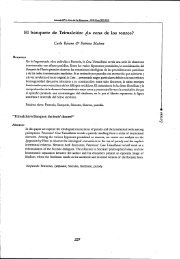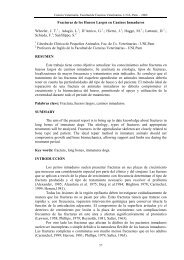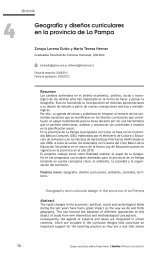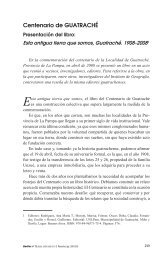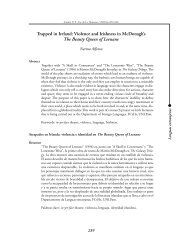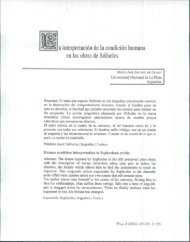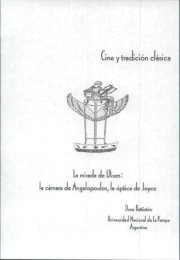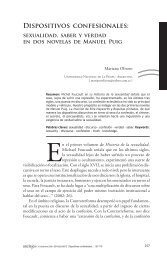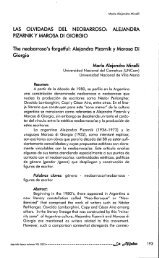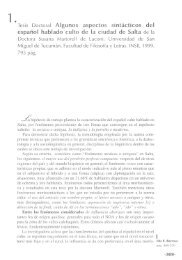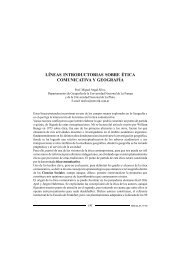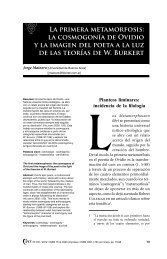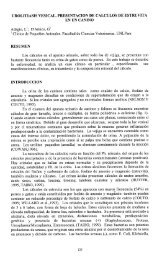Revista Completa - BIBLIOTECA UNLPam - Universidad Nacional ...
Revista Completa - BIBLIOTECA UNLPam - Universidad Nacional ...
Revista Completa - BIBLIOTECA UNLPam - Universidad Nacional ...
You also want an ePaper? Increase the reach of your titles
YUMPU automatically turns print PDFs into web optimized ePapers that Google loves.
Comunidad e individuo en<br />
la democracia antigua 1 .<br />
Naturaleza, ley y sociedad<br />
Laura Sancho Rocher [<strong>Universidad</strong> de Zaragoza/ Grupo Hiberus]<br />
Resumen: La mayor parte de la crítica actual<br />
coincide en que en la práctica política griega<br />
de la democracia no existió algo parecido a la<br />
idea moderna de los derechos del individuo.<br />
Nos cuestionamos en este ensayo si, como<br />
en la época moderna, la democracia clásica<br />
estuvo precedida o acompañada del desarrollo<br />
de la noción de un derecho natural, común<br />
al género humano y basado en la natural<br />
igualdad en dignidad de los individuos. Por<br />
ello hacemos una lectura del pensamiento de<br />
filósofos y teóricos de finales del s. VI y s. V<br />
a.C. que expusieran alguna versión del progreso<br />
humano o del contrato social, o bien que<br />
analizaran el desarrollo de la realidad política<br />
en base a la antítesis νόμος-φύσις. Así como<br />
en la realidad de la democracia ateniense no<br />
es posible captar la existencia de las garantías<br />
individuales previas y por encima del poder del<br />
δῆμος, tampoco existe un pensamiento liberal<br />
griego que hubiera podido servir de base a esa<br />
definición legal.<br />
Palabras clave: ley natural - progreso - contrato<br />
social - nómos - phýsis.<br />
Community and Individual in Classical<br />
Democracy. Nature, Law and Society<br />
Abstract: Nowadays, the vast majority of<br />
scholars agree that in the Greek democracy<br />
there was never something analogous to the<br />
modern concept of human rights. This essay<br />
examines whether classical democracy was, as<br />
in the Modern Age, preceded or accompanied<br />
by the development of the notion of natural law,<br />
common to all mankind and based on dignity’s<br />
natural equality among individuals. The pages<br />
that follow investigate texts by some VI-V B.C.<br />
philosophers and theoreticians that either<br />
show some evidence of an account of human<br />
progress or an outline of the hypothetical idea of the<br />
social contract, or that analysed the political development<br />
on the basis of the νόμος-φύσις anthithesis. It’s<br />
impossible to find the existence of individual guarantees<br />
in Athenian democracy previous and above the power of<br />
the δῆμος and, in the same way, there existed no Greek<br />
liberal thought that could have served as basis for that<br />
legal definition.<br />
Key words: natural law - progress - social contract -<br />
nomos - physis.<br />
Comparar 1 la democracia<br />
antigua con la moderna<br />
ha constituido un<br />
ejercicio habitual en<br />
la discusión política,<br />
historiográfica y filosófi<br />
ca desde el mismo<br />
nacimiento del liberalismo<br />
democrático. Mientras en 1819,<br />
Benjamin Constant 2 señalaba las<br />
1 Estudio realizado en el marco del proyecto<br />
HAR2008-04897/HIST. Este trabajo se complementa<br />
con el que aparecerá en las Actas<br />
del Segundo Coloquio Internacional “El<br />
Estado en el Mediterráneo Antiguo” celebrado<br />
en Buenos Aires (septiembre 2009).<br />
2 “De la libertad de los antiguos comparada<br />
con la de los modernos”, una conferencia<br />
Nº XV / 2011 / ISSN 1514-3333 (impresa) / ISSN 1851-1724 (en línea), pp. 133-157<br />
133



